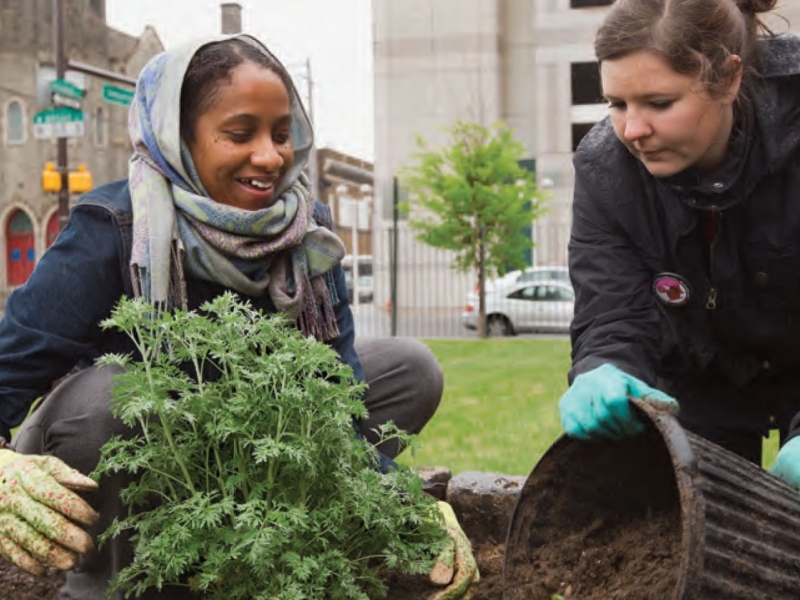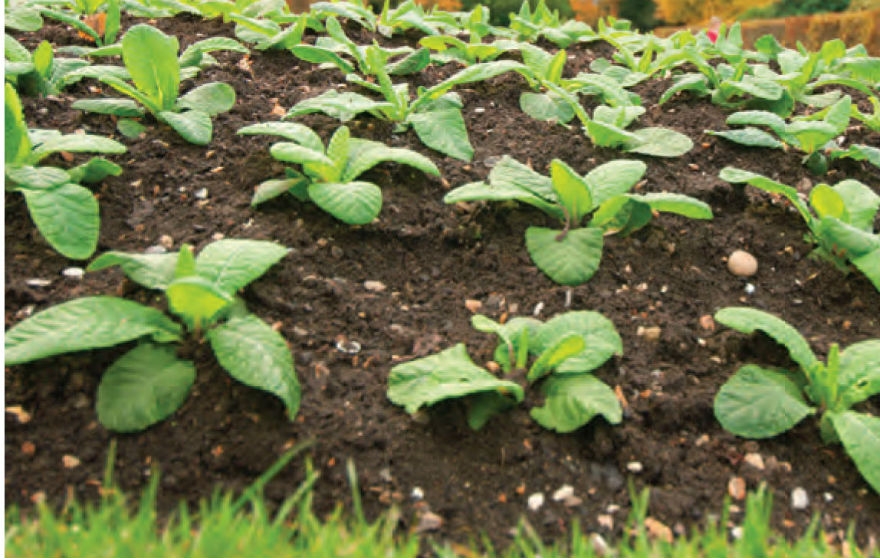Spruce Up

Story by Sharon L. Florentine
Photography by Ryan S. Brandenberg and Joseph V. Labolito
The answer to the obesity epidemic and climate change might reside right on your block. As communities look to combat the rising price of healthful food, reduce urban blight and generate a greater sense of community in urban areas, the popularity of community gardening is growing.
According to the U.S. Department of Agriculture, 15 percent of the world´s food grows in urban and suburban areas—on rooftops and in backyards, vacant lots and containers on patios, porches and fire escapes. Take Temple Community Garden (TCG): With three locations in North Philadelphia, TCG is a part of a nationwide movement toward sustainability, food sovereignty and economic equality taking root in cities across the country.
Usually, urban gardens are developed in vacant lots and function like any business or nonprofit, but volunteers perform most of the work and local residents fill key positions and tend the garden.
"In the U.S., urban gardens are popping up at an incredible rate," says Anne Preston, a senior environmental studies major and programs director at Urban Tree Connection, a Philadelphia nonprofit dedicated to "greening" urban spaces. "It is likely a combination of factors—a reaction to our obesity crisis, which can largely be attributed to the low cost of unhealthful food and Americans´ sedentary lifestyles, and the increasing number of ´food deserts,´ especially in low-income urban areas, where there is often little to no access to healthful food and grocery stores."
Building an urban garden is one way to combat those issues directly, bringing fresh produce closer to urbanites and providing a space for a group activity. In certain cities with a lot of vacant land, like Philadelphia, gardening in abandoned lots makes sense because there is so much empty space to use—as many as 40,000 vacant lots, according to Preston. For other, denser cities, there is a whole other level of unused space: rooftops.
GROW YOUR OWN
There are plenty of ways to get your own garden off the ground. Though Preston got her start by interning at organic farms in New Zealand before she attended Temple, you do not need an extensive agricultural background to cultivate land. Katherine Ament, a sophomore environmental studies major and TCG president-elect, had no experience when she took up gardening as an extracurricular activity.
Want to combat urban blight in your area? Ament and Preston have some tips for you.
1. SLOW DOWN.
You might feel overwhelmed at first, but Ament notes that one of the first obstacles many people face is that they want to do too much too quickly.
"Remember to take it slow—only take on as much as you can handle," she advises. "Especially when you´re learning about urban and community agriculture, it´s easy to get carried away with all the options available: ´I want to use earthworms! I want to have a beehive! I want to be sure to have cross-pollinators!´ You really have to take it one step at a time."
2. PARTNER UP.
First off, you must secure the land you plan to use. Research city records to find out who owns the land you want to transform, and then make contact with him or her, Preston says. A simple land-use agreement—available for downloading from the American Community Gardening Association—will spell out the terms of use and lay out some legal protections for you and the property owner. Often, the agreement is all you need to overhaul an abandoned lot.
Involving the surrounding community can mean the difference between success and failure, Preston says. Talk with residents living around the space in which you want to garden to determine if the lot is a well-worn pathway, if you will encounter resistance from anyone who currently uses the space and if the surrounding neighbors will support your initiatives or view you as an interloper.
"Oftentimes, the answer is a bit of both [support and wariness]," says Preston, who was instrumental in getting TCG off the ground during her freshman year at Temple. "But it´s important to be respectful and mindful of the space you are entering and figure out how your work can best serve the people there."
Once community members are interested in such projects, they are often eager to get involved, distributing flyers, organizing meetings, planting and weeding.
3. READ UP.
Then, of course, it is time to plan your crops. Take advantage of any and all available resources to learn as much as possible about methods, best practices, and what kind of care the plants and produce you want to try to grow will need. "Find all the information you can from wherever you can," Ament says. "Online, libraries, television, blogs and podcasts—you name it. If you can, find a place to get hands-on gardening experience and literally get your hands dirty."
4. DIVVY UP.
Divide tasks in whatever way is most practical, by recruiting workers to volunteer for specific duties based on their interests and expertise, or by assigning tasks equally. A central calendar—on paper or online—can help you determine a task list and timeframes, and can ensure that duties from planting to picking are covered.
5. BE REALISTIC.
Preston also has some sage advice on what not to do. First and foremost, do not expect it to be easy. "Right now, our culture is romanticizing farming," she says. "While it can be rewarding, it also is very hard work and has its moments—or days and weeks—of discouragement and challenge. Don´t get discouraged if some plants don´t grow amazingly; every season has a learning curve and there´s always room for growth." And though bouts with vandalism are a possibility and can be daunting, she recommends working with local young people, who might be able to protect the plot and gain a sense of ownership of it.
Preston aims to erase the perception that urban agriculture is a fad that will fade as "higher" uses or commercial development take over these important spaces.
After all, TCG´s presence in North Philadelphia continues to grow. The group built a small garden at nearby Penrose Recreation Center at 12th Street and Susquehanna Avenue in 2009, not long after it opened the first space at Broad and Norris streets. Preston got involved with the second space, too, working with a group of enthusiastic elementary school children to plant and maintain the center´s vegetable garden. The group also inherited a space at Diamond and Carlisle streets called the Sonia Sanchez Garden—named after the Temple professor emerita of English and Philadelphia´s first poet laureate.
For TCG, urban agriculture is a gateway to a bigger conversation about sustainability, urban growth and planning, and economics. It gives area residents opportunities to connect with where their food is coming from, and a way to demonstrate that communities can help themselves.
"We want to show people that it´s possible to grow your own food in an urban setting and connect with the surrounding community," says Kathleen Grady, director of sustainability at Temple. "These kinds of initiatives are critical to helping people understand how to build not just a garden or a farm, or to contribute to environmental causes, but to build a community."
One of the ways Temple´s Office of Sustainability fosters that sense of community is by using social media to communicate about garden hours and initiatives. Ament adds that the group actively works with schools and community organizations to get even the youngest neighbors involved.
"Last year, we worked with Dunbar Elementary School, teaching the kids about urban gardening," Ament says. "Then we partnered with Urban Jungle, a local retailer in South Philadelphia, to plant a living wall. (A living wall is a wall covered in plant life.) The kids were able to plant their own miniature herb gardens. It was a fantastic experience for them and for us."
Preston plans to spend this year expanding Urban Tree Connection´s programming, from a burgeoning teen summer-work program to cooking classes, gardening clubs and educational programs that develop gardening skills in the community, so the gardens´ neighbors can take them over completely.
"I firmly believe that urban gardeners can generate income and create an economy of scale that will allow their food to reach more people and create jobs in neighborhoods where unemployment is chronically high," Preston says. "Now, it is a matter of organizations like ours figuring out the farming techniques and business models that work.And it is a matter of cities acknowledging the importance of urban gardens and protecting these spaces."
Sharon Florentine is a freelance writer who has covered everything from holistic veterinary care to computer technology. She lives in Connecticut with her husband, a 2-year-old son and a rescued pit bull.
